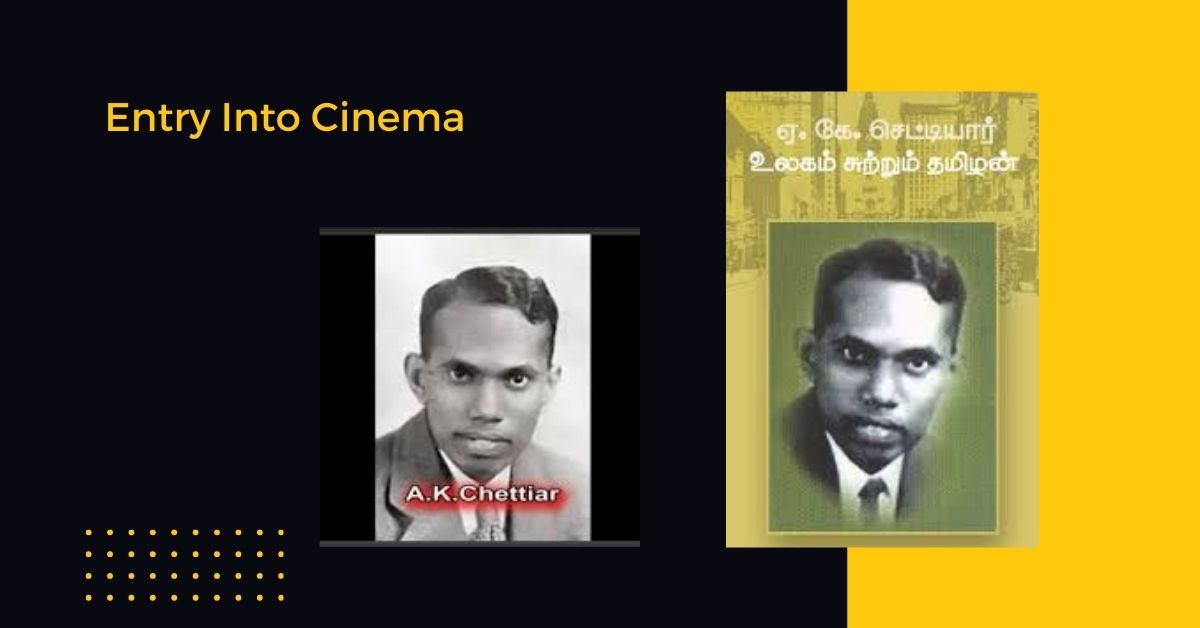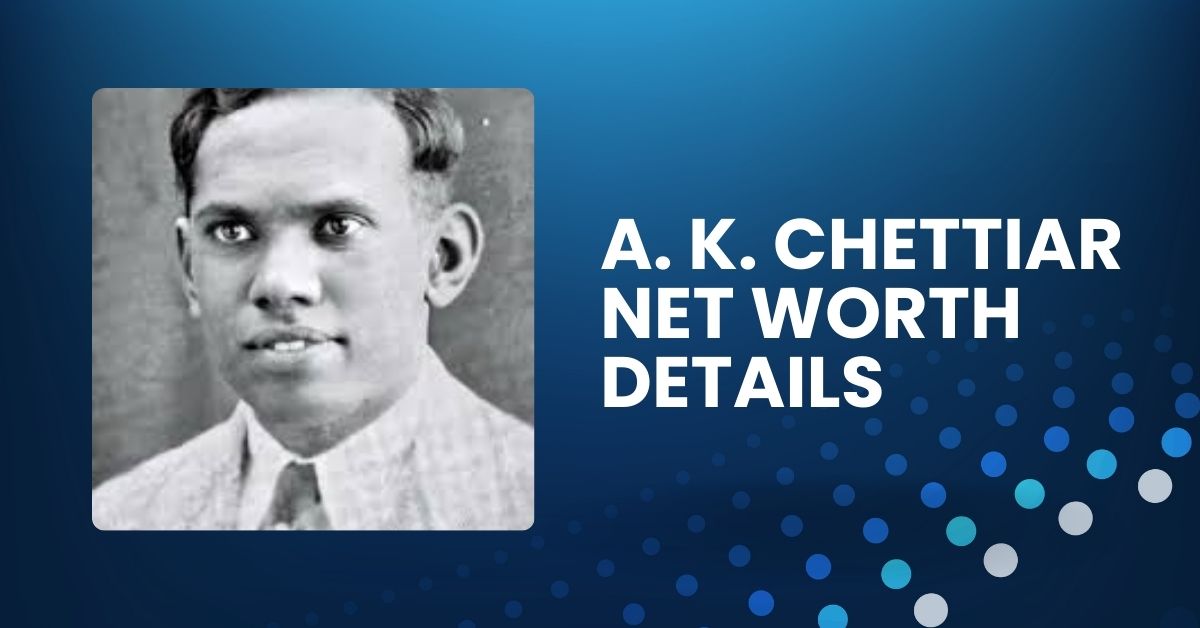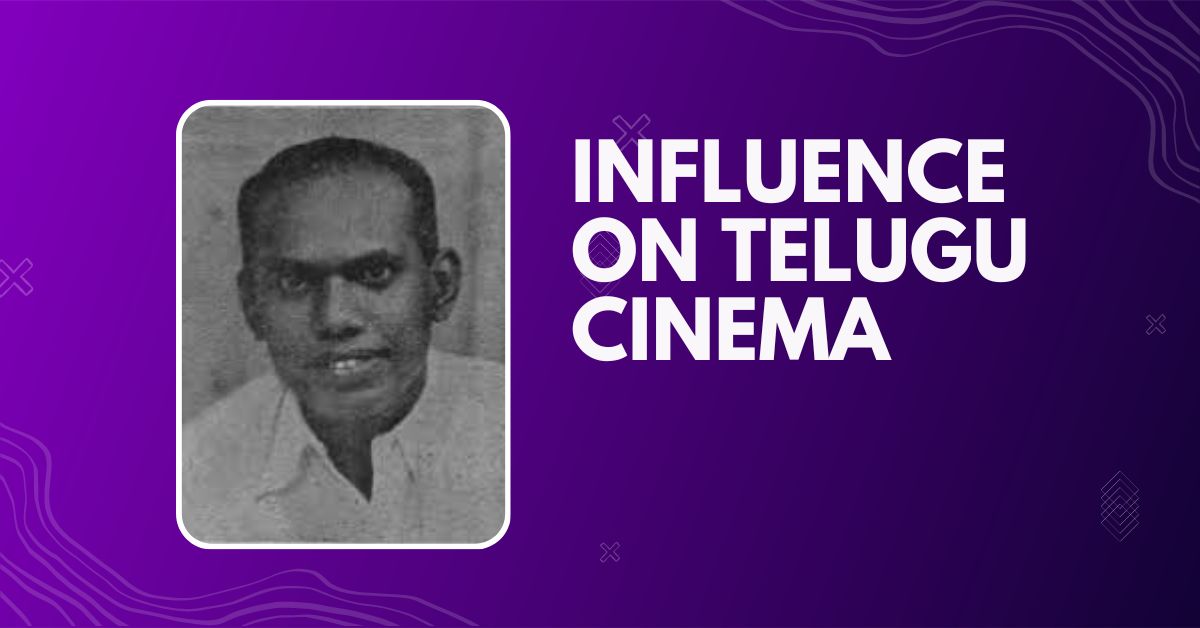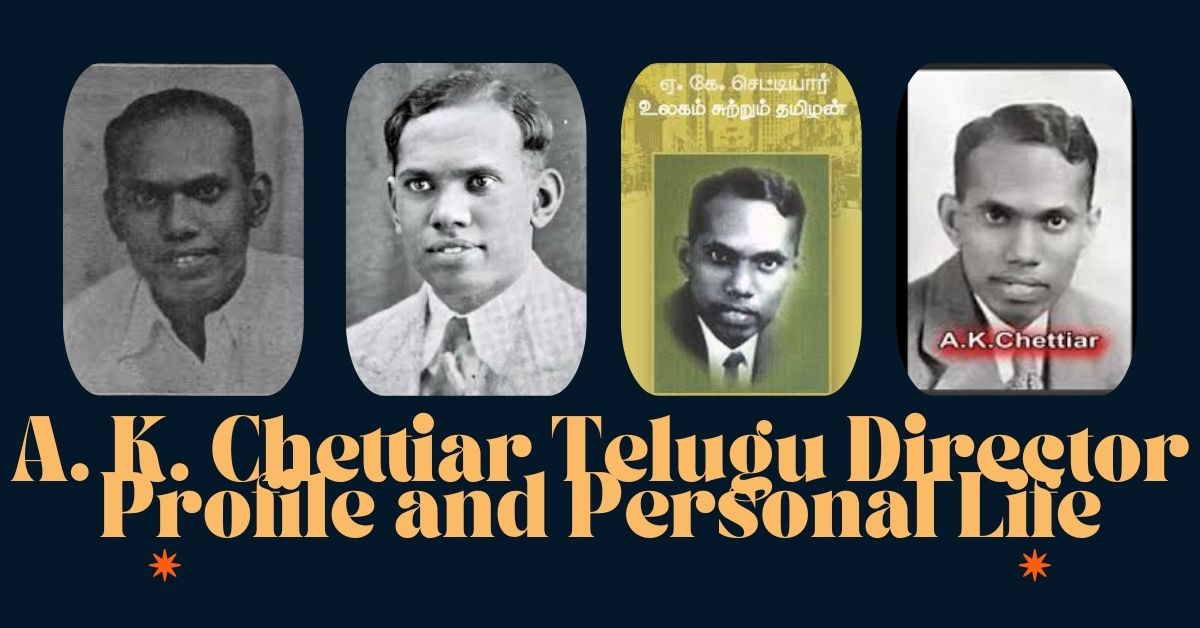Know the details about A. K. Chettiar Telugu Director Profile and Personal Life, A. K. Chettiar’s Telugu Director Top Films, and Net Worth.
A. K. Chettiar Telugu Director Profile and Personal Life
A.K. Chettiar is a name synonymous with the golden era of Telugu cinema. As a director, he has contributed immensely to shaping the film industry, especially in South India. Although many may not be familiar with his name today, his legacy continues to impact filmmakers and enthusiasts alike. Known for his innovative storytelling and ability to blend traditional narratives with modern themes, A.K. Chettiar remains a figure of inspiration for many upcoming directors. This blog post delves deep into his personal and professional life, highlighting his influence on Telugu cinema.
Early Life and Background
A. K. Chettiar, a significant figure in Indian documentary filmmaking, was born in the early 20th century in Tamil Nadu. While the exact date of his birth remains unclear, he grew up at a time when Indian cinema and journalism were gaining momentum. His passion for storytelling and travel influenced his early career, shaping him into a renowned filmmaker and writer. Chettiar ventured into journalism at a young age and quickly found his calling in film production.
Personal Life
Family and Relationships
Despite his busy professional life, A.K. Chettiar was a family man. He married Lakshmi, a school teacher from his native village, in 1950. The couple had three children—two daughters and a son. His wife played a crucial role in supporting him throughout his journey in the film industry, providing emotional stability during the highs and lows of his career.
Chettiar was known to be a loving father and husband. His daughter Anuradha followed in his footsteps and pursued a career in film production, while his son Ramachandran went into academia, becoming a professor of film studies.
Personal Interests
Aside from cinema, Chettiar had a wide range of interests. He was an avid reader and had a keen interest in philosophy and spirituality. His love for literature and the arts is reflected in the layered storytelling and the philosophical underpinnings in his films.
Chettiar also enjoyed traveling, and he often visited different parts of India and the world to gain inspiration for his films. His love for learning new cultures and understanding human emotions was a hallmark of his personality.
Entry Into Cinema
The Early Struggles
Chettiar’s journey into cinema was not an easy one. After completing his college education, he moved to Chennai, which was then the hub of South Indian cinema. Armed with his passion for storytelling and a few short scripts, he approached production houses, hoping to get a break as a director.

In the early days, he struggled to make connections in the industry. At that time, Tamil and Telugu films were dominated by a few established directors, leaving little room for newcomers like Chettiar. Undeterred by rejections, he worked as an assistant director on small-budget films to gain practical experience. His relentless pursuit of excellence in filmmaking eventually paid off when he got the opportunity to direct his first film.
First Break as a Director
A.K. Chettiar’s directorial debut came in the mid-1950s when he was asked to direct a Telugu film titled Manchi Kutumbam (1957). The film, though not a massive commercial success, earned him recognition for his innovative approach to family dramas. It was evident that Chettiar was someone who thought outside the box, always pushing the envelope of what could be done with a cinematic narrative.
The film explored complex family dynamics, touching on themes of sacrifice, love, and social values, which struck a chord with the audience. Chettiar’s use of visual symbolism and his nuanced portrayal of relationships caught the attention of both critics and viewers.
Career and Occupation
A. K. Chettiar is best remembered as a pioneering documentary filmmaker and travel writer. He began his career in journalism, establishing magazines such as Dhanavanigan and contributing to publications like Ananda Vikatan. His most famous work came in the form of his documentary, Mahatma Gandhi: Twentieth Century Prophet, a monumental project that took several years to complete. Chettiar traveled across India, South Africa, and London to collect 50,000 feet of footage of Gandhi’s life. The film was released in 1940 and gained widespread recognition, although it faced censorship from the British government at the time.
List of Films
| Film Title | Role | Year |
|---|---|---|
| Mahatma Gandhi: Twentieth Century Prophet | Director, Producer | 1940 |
| Bala Krishna | Director | 1961 |
| Maa Illu | Director | 1965 |
| Sati Anasuya | Director | 1968 |
| Chadarangam | Director | 1674 |
Awards and Recognition
Throughout his career, Chettiar received numerous accolades for his contributions to Indian cinema. Some of the prominent awards include:
- Nandi Award for Best Director for Bala Krishna (1961)
- Filmfare Award for Best Telugu Film for Sati Anasuya (1968)
- Padma Shri Award in 1975 for his contribution to the arts.
In 1985, he was honored with a Lifetime Achievement Award by the South Indian Film Chamber of Commerce.
A. K. Chettiar Telugu Director Net Worth Details
Sources of Income
A. K. Chettiar’s net worth, accumulated over his years in the industry, stemmed from a variety of income sources, which include:

- Film Production: Chettiar produced and directed many films, and some of his works have been deemed timeless classics. Revenue from these films contributed to his growing wealth.
- Documentaries: His iconic documentary on Gandhi, as well as other notable works, provided royalties and screening fees, both locally and internationally.
- Distribution Rights: Chettiar’s films were distributed in multiple regions, earning him a share of box office collections and home video sales.
- International Screenings: Since his works were showcased in global markets, Chettiar also benefitted from international screenings and film festival appearances.
Estimating A. K. Chettiar’s Net Worth
While specific figures regarding A. K. Chettiar’s net worth during his lifetime are difficult to ascertain due to the historical nature of his career, experts believe that he accumulated a sizable fortune for the time. His revenue came from both his documentaries and feature films, along with various side ventures related to film production and distribution.
In today’s terms, adjusted for inflation, A. K. Chettiar’s net worth could be estimated at a value equivalent to several million Indian Rupees. This approximation takes into account his earnings from films, documentaries, distribution rights, and various other business deals.
Financial Contributions to the Industry
Beyond his wealth, A. K. Chettiar’s investments in the Indian film industry helped pave the way for future generations of filmmakers. He was a pioneer in film production techniques, and his ventures set a precedent for how directors could manage their own production houses, invest in cutting-edge technology, and create content that appealed to both domestic and international audiences.
Legacy and Wealth Distribution
Chettiar’s legacy lives on through his films, documentaries, and the production companies he established. His family, though relatively low-profile, continues to manage some of his estates and properties. Additionally, his works are often featured in film archives, and their screenings still generate revenue for his estate.
As a director, Chettiar wasn’t focused solely on amassing personal wealth; rather, he prioritized the dissemination of important cultural and historical narratives through cinema. However, his financial acumen allowed him to build a comfortable and lasting fortune.
Final Thoughts
A. K. Chettiar may not be a contemporary figure, but his contributions to Indian cinema, especially Telugu and Tamil films, have ensured his legacy in the film world. His net worth, built from a successful career that spanned decades, serves as a testament to his visionary approach to filmmaking. Though exact figures are challenging to pin down, it’s clear that his influence extended far beyond just his films, reaching both national and international markets.
As the industry continues to evolve, A. K. Chettiar’s work remains a subject of study for both film historians and enthusiasts who appreciate the cultural and financial impact of his projects.
Legacy and Impact
Influence on Telugu Cinema
A.K. Chettiar’s influence on Telugu cinema is immense. He was one of the few directors who dared to experiment with narrative structures and tackled themes that were considered taboo at the time. His films laid the foundation for many contemporary filmmakers who sought to combine commercial appeal with meaningful storytelling.

Directors like K. Vishwanath and Mani Ratnam have openly acknowledged the impact Chettiar had on their work. His films continue to be screened at various film festivals, and they serve as a study for film students and enthusiasts who want to understand the evolution of Telugu cinema.
Death and Legacy
A. K. Chettiar passed away in 1983, leaving behind a legacy that continues to inspire filmmakers and historians. His contribution to Indian documentary cinema, particularly his pioneering work on Gandhi, remains an important chapter in Indian film history. Chettiar’s dedication to documenting key moments in history set the stage for future documentary filmmakers in India.
About A. K. Chettiar
A. K. Chettiar was a multifaceted personality, known for his contributions to documentary filmmaking, travel writing, and journalism. His dedication to capturing pivotal moments in history, like the life of Mahatma Gandhi, solidified his status as a pioneer in his field. Through his travels and writings, he brought Indian history and culture to the global stage, influencing generations of filmmakers and writers.
Things to Know About A. K. Chettiar
- Pioneer in Documentary Filmmaking: A. K. Chettiar’s documentary on Gandhi is one of the earliest and most comprehensive works documenting the life of the leader.
- Extensive Traveler: His travel essays and books are still considered some of the best in Tamil literature.
- Journalist at Heart: Before filmmaking, he made significant contributions to Tamil journalism, founding and editing several magazines.
FAQs About A. K. Chettiar
Q1. What is A. K. Chettiar best known for?
A. K. Chettiar is best known for his documentary Mahatma Gandhi: Twentieth Century Prophet, which captured important footage of Gandhi’s life across different stages and locations.
Q2. How did A. K. Chettiar contribute to Tamil literature?
Chettiar wrote numerous travelogues, including Ulagam Surrum Tamilan (The Globe Trotting Tamil), and compiled and edited more than 140 travel essays in Tamil.
Q3. What challenges did A. K. Chettiar face with his documentary on Gandhi?
His documentary faced censorship from the British government and was withdrawn from theaters, but it was later re-released in Hindi post-Indian independence.
Q4. Is A. K. Chettiar’s documentary on Gandhi still available?
While the original documentary is lost, abridged versions have been found and restored, providing a glimpse into his pioneering work.
Q5. What is A. K. Chettiar’s legacy?
Chettiar’s legacy lies in his groundbreaking work in documentary filmmaking and travel literature, as well as his commitment to preserving and sharing India’s cultural and political history.
A.K. Chettiar’s journey from a young boy in Tamil Nadu to one of Telugu cinema’s most celebrated directors is a testament to his passion, dedication, and love for storytelling. His unique ability to fuse traditional values with modern narratives made him a visionary filmmaker who was ahead of his time.
His films continue to influence generations of directors, and his impact on the Telugu film industry remains significant. Today, A.K. Chettiar is remembered not just as a filmmaker but as a cultural icon who used the medium of cinema to communicate powerful messages and bring about social change.
Click here to learn more about A. K. Chettiar Telugu Director Profile and Personal Life
Click here to learn more about P. Pullaiah’s Telugu Director Profile and Personal Life


1 thought on “A. K. Chettiar Telugu Director Profile and Personal Life”